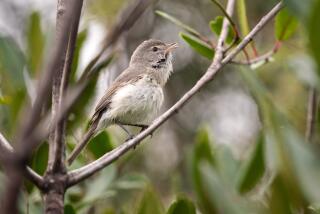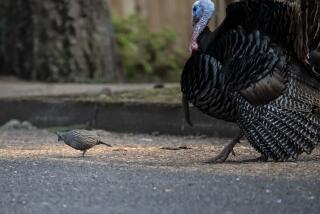Lullaby of Birdland : This Particular Cockatiel’s Motto Was ‘Squawk Loudly and Carry a Big Beak’
- Share via
MY WIFE’S COCKATIEL died the other day. I don’t know how old he was, but he seems to have been around almost as long as I have. I don’t know what sex it was, but I always thought of it as a he, possibly because he was aggressive, mean-spirited and shrewish.
If anyone thinks that only females can be shrewish, I suggest that person is being sexist. Males make the worst shrews.
I had almost no contact with the bird. He stayed in his cage, I stayed in mine. But I was reminded of his presence every day. Evidently he disliked the world and kept it cognizant of that hostility by belaboring it throughout the day with shrill imprecations. His shriek, repeated intermittently, could rip my peace of mind to shreds.
A cockatiel is a kind of parrot. I believe it is South American in origin, which might account for this one’s unhappiness here, away from his native rain forest. However, for a cockatiel, he may have been happy. His cage was in my wife’s bathroom, which, because of her daily showers, was usually humid. He was rather an attractive bird, except for his hideous prehensile beak and predatory eyes. He was mostly white, with streaks of black and yellow about the head and shoulders. He had a topknot.
I don’t believe he ever had a name. My wife called him Big Bird. She also has three parakeets and a canary. If any of them have names, she has never told me. I have no idea why she has birds. Nothing in her childhood predisposed her to keep birds. When I married her, I was unaware of this strange predilection.
Being members of the parrot family, cockatiels are supposed to be able to talk. The only conversation I ever had with Big Bird was when my wife went to France, leaving him in my care. Somehow, when I was trying to feed him, the bird got out. My wife has a three-foot-deep tiled bathtub. It takes athletic skill to get out of it. The bird made immediately for the tub and settled on the bottom, shrieking.
He ignored my entreaties to come out. Finally, I got down in the tub, grabbed the bird in one hand and tried to lift myself out of the tub with the other. Meanwhile, the bird sank his beak into the hand that held him. He was serious. His beak fastened onto my flesh and clamped down until I bled. The pain was excruciating.
Yelling obscenities at the bird at the top of my lungs, I climbed out of the tub, took two strides to his cage, shoved my hand in, wrenched it free from the bird’s grasp with my free hand and slammed his door.
He glowered at me, heaving. “Big deal!” he said, quite clearly.
As far as I know, those are the only words he ever spoke.
“My Big Bird died yesterday,” my wife told me simply.
She did not say how she’d disposed of the body, and I didn’t ask.
The next day she said, “I miss my bird.”
I pointed out that the bird had never tried to repay her for her love and care. He had rewarded her with nothing but looks of hatred from those glaring eyes, shrill protests and a recalcitrant rattling of his cage.
“He was company,” she said. “I knew he was there.”
I decided not to explore the implications of that remark.
The three parakeets are relatively quiet. They hop about in their common cage, chirping like old gossips. They seem to be happy, though how they can stand the confinement, I don’t know.
The canary has a cage of his own. When my wife picked him out at Hal’s Pet Shop, he was singing like Caruso. In recent months, however, he has fallen silent. Maybe he found out Caruso has been dead since 1921. He merely sits on a rung in his cage, fattening, and observing the limited world around him through his stupid little eyes.
Meanwhile, a reader writes that a friend has two parakeets that he bought at a pet store. “He is considering giving them freedom only if their chance of survival is good. If so, is spring the best time to let them go?”
I suspect that this correspondent’s “friend” is himself. He doesn’t want to admit that he is thinking of turning his parakeets out into the cold world. In any case, I am told that parakeets cannot survive in a natural environment. They would be easy marks for predators. My advice to this man, or his friend, is to free the birds on Mt. Washington. If history repeats itself, they will find their way to our door, and my wife will take them in.
Meanwhile, if anyone has any ideas about where to find homes for five wild cats, let me know.
More to Read
Sign up for Essential California
The most important California stories and recommendations in your inbox every morning.
You may occasionally receive promotional content from the Los Angeles Times.













